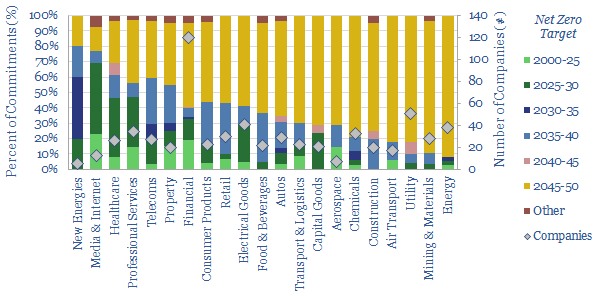The most comprehensive and useful online resource we have found to track different companies’ net zero commitments is zerotracker.net. The database is freely downloadable under a Creative Commons license. However, we have attempted to clean it up in this data-file, including some additional fields and analytics.
The result is 630 companies that have pledged to reach some definition of ‘net zero’. Although the commitments are somewhat skewed towards easier-to-decarbonize sectors, such as financials (22%), TMT (6%), professional services (5%), retail (5%), healthcare (4%).
The average year to achieve this is 2044, although again, it varies by sector, and easer-to-decarbonize sectors tend to have sooner-dated targets.
A key question is credibility. 20% of the companies are deemed to have unclear decarbonization objectives and 45% are assessed to lack a clear plan to reach their goals (interestingly, energy companies scored above average on both of these metrics, at 16% and 27%, which squares with our own experience that some sectors are working hard to tackle CO2).
Another key question is scope. We were impressed to find that 50% of companies are including Scope 3 emissions in their decarbonization targets.
Finally, the list is substantively composed of large public companies, of which 40% are in Europe, 30% are in the US, 15% in Japan, c5% in both Australia and Canada. Clearly if you are a large public company, operating in these geographies, then investors are increasingly going to start ‘marking you down’ if you do not have clear decarbonization targets. On the other hand, private companies and emerging world companies are vastly under-represented in this data-file, which will re-awaken old fears over industrial leakage, and re-iterates the need for practical and economic decarbonization.
In the spirit of open source data, our clean-up of the database is free to download, in case it is useful for you, or helps inform your own company’s decarbonization targets.
